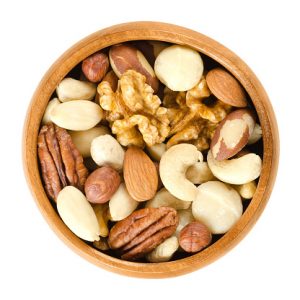 One of the scariest things that can happen to a person is developing cancer. Colon cancer, for example, is the third leading cause of cancer-related deaths in women and the second leading cause in men in the United States. In 2017, colon cancer is estimated to claim over 50,000 lives. However, a multiyear study suggests eating nuts along with an overall healthy diet and regular exercise can help colon cancer patients improve their chances of survival.
One of the scariest things that can happen to a person is developing cancer. Colon cancer, for example, is the third leading cause of cancer-related deaths in women and the second leading cause in men in the United States. In 2017, colon cancer is estimated to claim over 50,000 lives. However, a multiyear study suggests eating nuts along with an overall healthy diet and regular exercise can help colon cancer patients improve their chances of survival.
Colon cancer often forms after polyp formation in the large intestine. There are small clumps of cells on the lining of the colon that hold the potential to turn into cancer. Anyone can develop these polyps, but being over 50, a smoker, or having a family history of colon cancer give you a higher risk. If you don’t find and remove malignant polyps, they can spread, leading to cancer development.
Cancer recurrence reduced in nut eaters
Advertisement
A previous study looked at patients who were successfully treated for stage three colon cancer, which is where cancer has spread to the surrounding tissue but not into distant organs. Those who ate at least two ounces of nuts a week had a 42 percent lower chance of cancer recurrence and a 57 percent lower risk of dying from the disease. This finding helped bolster the results found in another study that found colon cancer survivors with healthy lifestyles had a 42 percent lower risk of death.
“Diet and lifestyle can influence both the risk of cancer coming back and can help you live longer. Once you get cancer, it’s not too late to adopt these. It makes a difference. A third of our cancer risk is related to things we can prevent,” said Dr. Bruce Johnson, chief clinical research officer at Dana-Farber Cancer Institute in Boston.
The study involving nut consumption followed more than 800 patients who had received surgery and chemotherapy for their colon cancer over a seven-year period. Participants filled out questionnaires that included questions about the number of nuts they ate. The researchers found that 19 percent of patients said they ate at least two ounces of nuts per week. This group had both a lower risk of cancer recurrence and higher overall survival.
The researchers stress that regular peanuts and peanut butter did not show any benefit. The nuts that provided cancer risk reduction were Brazil nuts, cashews, pecans, walnuts, and pistachios.
This is considered an observational study, so no clear cause-and-effect relationship can be proven. But the researchers find these results compelling nonetheless.
